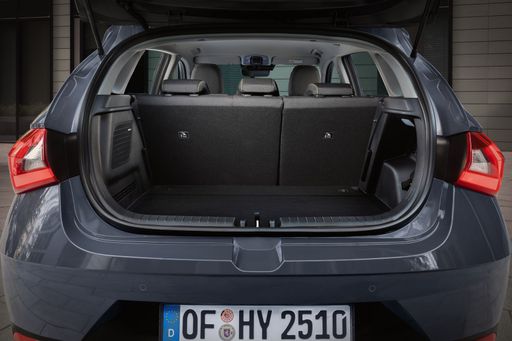Hyundai i20 vs BYD Dolphin Surf – Which model is better for everyday use?
Two cars, one duel: Hyundai i20 meets BYD Dolphin Surf.
Which one wins in performance, efficiency and value for money? Find out now!
Costs and Efficiency:
Looking at overall running costs, both models reveal some interesting differences in everyday economy.
Hyundai i20 has a a bit advantage in terms of price – it starts at 17400 £, while the BYD Dolphin Surf costs 19700 £. That’s a price difference of around 2305 £.
Engine and Performance:
Under the bonnet, it becomes clear which model is tuned for sportiness and which one takes the lead when you hit the accelerator.
When it comes to engine power, the BYD Dolphin Surf has a evident edge – offering 156 HP compared to 100 HP. That’s roughly 56 HP more horsepower.
In acceleration from 0 to 100 km/h, the BYD Dolphin Surf is evident quicker – completing the sprint in 9.10 s, while the Hyundai i20 takes 11.10 s. That’s about 2 s faster.
In terms of top speed, the Hyundai i20 performs somewhat better – reaching 183 km/h, while the BYD Dolphin Surf tops out at 150 km/h. The difference is around 33 km/h.
There’s also a difference in torque: BYD Dolphin Surf pulls hardly perceptible stronger with 220 Nm compared to 200 Nm. That’s about 20 Nm difference.
Space and Everyday Use:
Beyond pure performance, interior space and usability matter most in daily life. This is where you see which car is more practical and versatile.
Seats: Hyundai i20 offers to a small extent more seating capacity – 5 vs 4.
In curb weight, Hyundai i20 is a bit lighter – 1088 kg compared to 1294 kg. The difference is around 206 kg.
In terms of boot space, the Hyundai i20 offers slightly more room – 352 L compared to 308 L. That’s a difference of about 44 L.
In maximum load capacity, the Hyundai i20 performs slightly better – up to 1165 L, which is about 128 L more than the BYD Dolphin Surf.
When it comes to payload, Hyundai i20 noticeable takes the win – 472 kg compared to 344 kg. That’s a difference of about 128 kg.
Who comes out on top?
Overall, the Hyundai i20 shows itself to be barely ahead and secures the title of DriveDuel Champion.
It convinces with the more balanced overall package and proves to be the more versatile choice for everyday use.

Hyundai i20
Hyundai i20
The Hyundai i20 impresses with its sleek design and modern aesthetics, making it a stylish choice in the compact car segment. Its interior is thoughtfully designed, offering comfort and advanced technology for a pleasurable driving experience. The vehicle also stands out with its efficient performance and agile handling, making city driving a breeze.
details @ hyundai.news
@ hyundai.news
 @ hyundai.news
@ hyundai.news
 @ hyundai.news
@ hyundai.news
 @ hyundai.news
@ hyundai.news
 @ hyundai.news
@ hyundai.news
BYD Dolphin Surf
The BYD Dolphin Surf is an intriguing model that combines sleek design with modern electric technology, making it an appealing choice for urban commuters seeking sustainability and style. Its dynamic exterior design is complemented by an interior that prioritizes comfort and functionality, reflecting the brand's commitment to innovation. The model also offers impressive handling and a smooth driving experience, embodying the shift towards eco-friendly transportation.
details

|
|
|
|
|
Costs and Consumption |
|
|---|---|
|
Price
17400 - 24000 £
|
Price
19700 - 26600 £
|
|
Consumption L/100km
5.2 - 5.3 L
|
Consumption L/100km
-
|
|
Consumption kWh/100km
-
|
Consumption kWh/100km
15.5 - 16 kWh
|
|
Electric Range
-
|
Electric Range
220 - 322 km
|
|
Battery Capacity
-
|
Battery Capacity
-
|
|
co2
119 - 121 g/km
|
co2
0 g/km
|
|
Fuel tank capacity
40 L
|
Fuel tank capacity
-
|
Dimensions and Body |
|
|---|---|
|
Body Type
Hatchback
|
Body Type
Hatchback
|
|
Seats
5
|
Seats
4
|
|
Doors
5
|
Doors
5
|
|
Curb weight
1088 - 1190 kg
|
Curb weight
1294 - 1390 kg
|
|
Trunk capacity
352 L
|
Trunk capacity
308 L
|
|
Length
4065 - 4075 mm
|
Length
3990 mm
|
|
Width
1775 mm
|
Width
1720 mm
|
|
Height
1450 - 1455 mm
|
Height
1590 mm
|
|
Max trunk capacity
1165 L
|
Max trunk capacity
1037 L
|
|
Payload
450 - 472 kg
|
Payload
344 kg
|
Engine and Performance |
|
|---|---|
|
Engine Type
Petrol
|
Engine Type
Electric
|
|
Transmission
Automatic, Manuel
|
Transmission
Automatic
|
|
Transmission Detail
Dual-Clutch Automatic, Manual Gearbox
|
Transmission Detail
Reduction Gearbox
|
|
Drive Type
Front-Wheel Drive
|
Drive Type
Front-Wheel Drive
|
|
Power HP
79 - 100 HP
|
Power HP
88 - 156 HP
|
|
Acceleration 0-100km/h
11.1 - 13.7 s
|
Acceleration 0-100km/h
9.1 - 12.1 s
|
|
Max Speed
166 - 183 km/h
|
Max Speed
150 km/h
|
|
Torque
113 - 200 Nm
|
Torque
175 - 220 Nm
|
|
Number of Cylinders
3 - 4
|
Number of Cylinders
-
|
|
Power kW
58 - 74 kW
|
Power kW
65 - 115 kW
|
|
Engine capacity
998 - 1197 cm3
|
Engine capacity
-
|
General |
|
|---|---|
|
Model Year
2024
|
Model Year
2025
|
|
CO2 Efficiency Class
D
|
CO2 Efficiency Class
A
|
|
Brand
Hyundai
|
Brand
BYD
|
What drivetrain options does the Hyundai i20 have?
The Hyundai i20 is offered with Front-Wheel Drive.
The prices and data displayed are estimates based on German list prices and may vary by country. This information is not legally binding.
